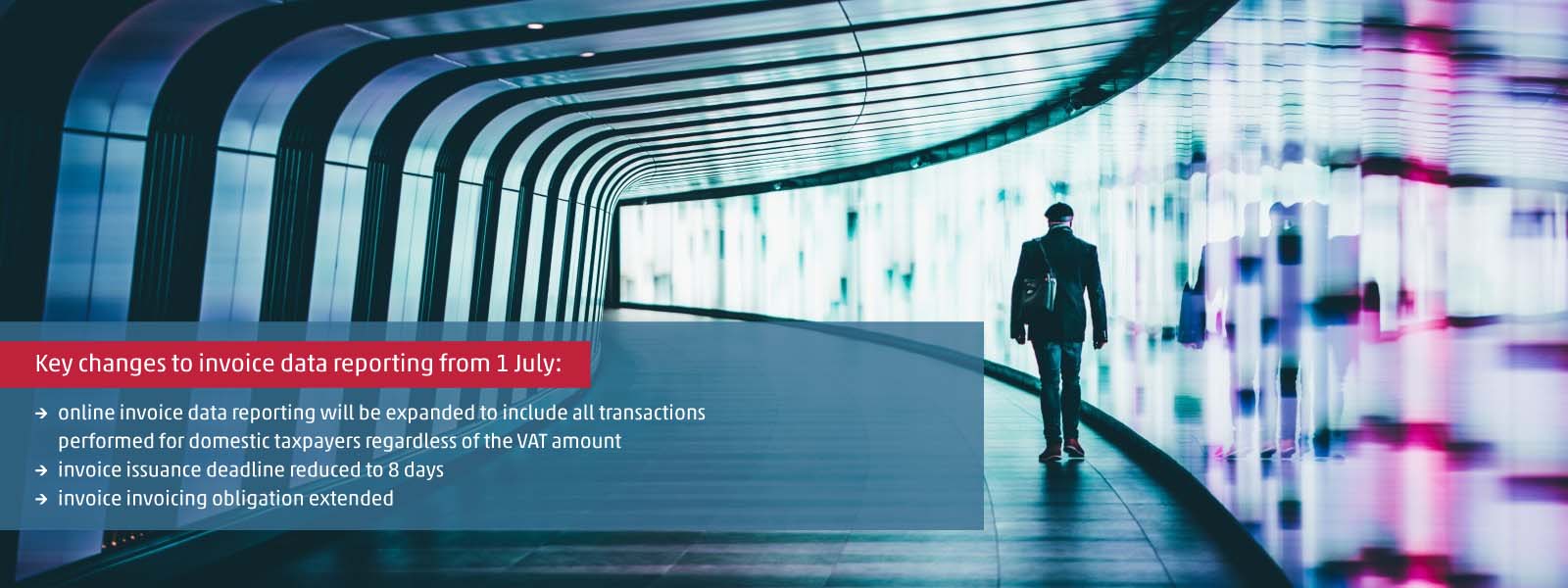As originally planned, online invoice data reporting will be expanded from 1 July: there will be no postponement of this even in spite of the coronavirus pandemic. It is vital to be prepared for this day, even if it cannot be ruled out that the NAV will not issue any penalties until 30 September with respect to the broader scope of data.
So what are we talking about here exactly? As we previously discussed in detail, online invoice data reporting was introduced in Hungary in July 2018, which meant the automatic online reporting by invoicing software, without human intervention, of data on invoices issued by taxpayers to other taxpayers, and the recording of handwritten invoices in the same system. However, there are currently thresholds to the reporting obligation: the rule only applies to invoices that include VAT of at least HUF 100,000 (roughly EUR 290).
We have also reported in detail about the already implemented and planned changes regarding invoice data reporting, such as the XSD structure used by invoicing software programmes which changed from 1 April, and how the system will change from 1 July and from 1 January 2021. In this article we would like to remind you of the main changes taking effect from 1 July.
Invoice data reporting threshold
From 1 July the afore-mentioned threshold will drop from HUF 100,000 to 0, which essentially means that after 30 June, all invoices issued to domestic taxpayers (on products/services with Hungarian place of supply) must be reported to the National Tax and Customs Administration (NAV), even if the transaction is subject to the reverse-charge mechanism in Hungary or is VAT exempt.
While this only means setting the HUF 100,000 threshold to zero in the invoicing software for most companies, there will be many entities for whom the VAT on their issued invoices fell short of the threshold so far, or their activity meant that they did not have to issue VAT invoices. (For example, companies trading in agricultural goods, most of whom issue invoices under the reverse-charge mechanism.) These companies generally used handwritten invoices (printed block of invoices) if from time to time they had to issue their taxpaying customers with invoices that had VAT in excess of HUF 100,000. In their case, abolishing the threshold brings a significant change, and what is more, they have to register in the NAV’s system for this and learn phrases such as replacement key, signature key or technical ID. They also have to check whether the invoicing software they use is capable of handling the changes. Companies that only invoice private individuals (not taxpayers) are getting a little more time as they only have to ensure compliance with the invoice data reporting obligation from 1 January 2021.
Time for issuing invoices
The time earmarked for issuing invoices from the date of performance will fall from 15 days to 8 days from 1 July. However, this amendment will apply for the first time to invoices with a performance date of after 30 June 2020.
Inclusion of tax number
From 1 July, invoices must also include the tax number of the domestic taxpayer buying the product or service, more precisely: the invoice must contain the first 8 digits of the taxpaying customer’s tax number – regardless of the amount of output VAT on the invoice. Consequently, the provision of the VAT Act that relates to the mandatory content of invoices has also changed.
Again, this amendment will only apply for invoices with a performance date of after 30 June 2020. If, after 1 July, you accept an invoice subject to the rules on ordinary taxation that does not include the first 8 digits of your tax number, then you can deduct the tax, but only if the performance date is prior to 1 July and the amount of output VAT does not exceed HUF 100,000.
It is important to note that for reverse-charge invoices the entire tax number (11 digits) must be stated on the invoice.
Expansion of invoice-issuing obligation
From 1 July the following tax-exempt activities will no longer be exempt from issuing invoices:
- other education,
- health-care services not performed as a public service,
- activities performed by dentists and dental technicians,
- services of cooperating groups,
- real estate sales.
New NAV development
Keeping with the times, or perhaps even getting ahead of the times, the NAV has developed a mobile telephone application for invoice issuing, which could complement the NAV Online Invoice system if invoices are not issued using own invoicing software. This application is already available for downloading, it is completely free and has various functions, such as issuing, modifying and invalidating invoices and prepayment invoices, the automatic performance of invoice data reporting, electronic invoicing, handling partner and product master data, as well as querying outgoing and incoming invoices. Hopefully this will do away with the need for handwritten invoices in many cases, along with the extra administration associated with this.
For companies struggling with this topic we recommend the services of WTS Business Automation Kft. This business line of ours offers support for invoicing software that does not yet have the required data reporting function ensuring compliance with Hungarian laws and regulations, and for developing and operating other solutions related to invoice data reporting. Feel free to contact us.











